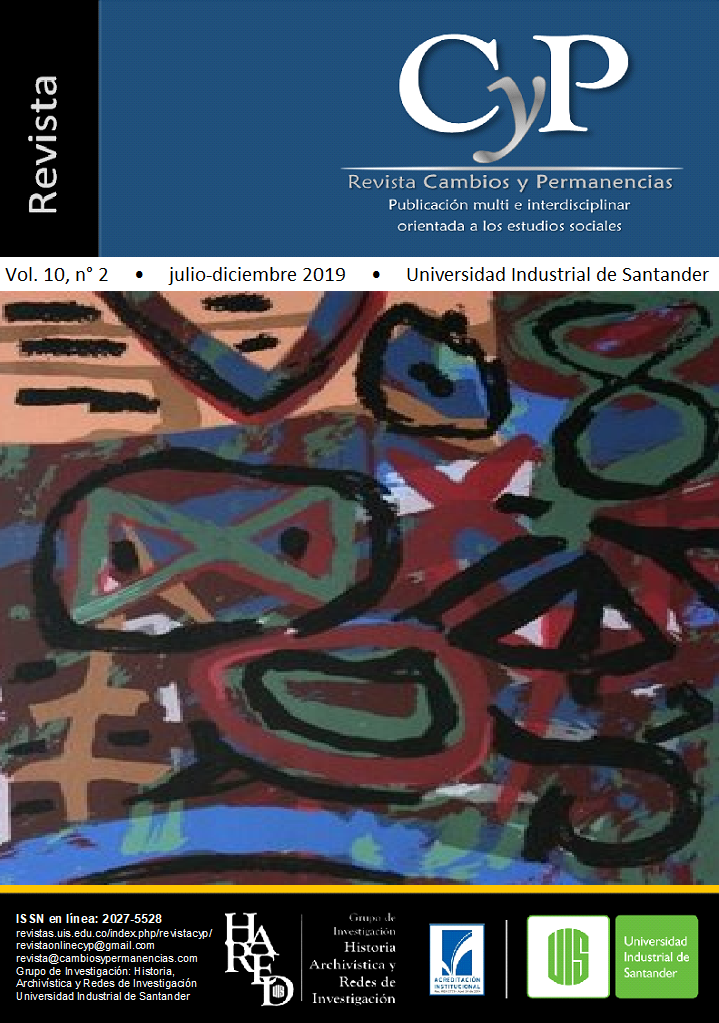Conceptual contributions Emotions and feelings in the fight for memory of the Mothers of ‘false positives’ of Suacha and Bogotá (MAFAPO)
Published 2019-12-03
Keywords
- Memory,
- anthropology of emotions,
- ‘false positives’,
- MAFAPO,
- oblivion
How to Cite
Abstract
At the beginning of 2018 a group of women created MAFAPO, which stands for Madres de ‘Falsos Positivos’ de Suacha y Bogotá. The group is integrated by women relatives of men killed in the so-called ‘false positives’: a practice where the National Army of Colombia recruited and murdered civilians that were presented as casualties killed in combat; for these killings the military received rewards. This text combines tools from the anthropology of emotions with memory studies in order to set the importance of the emotional dimension in the claims of MAFAPO. These women demand truth, justice, reparation and guarantees of no repetition, in a constant battle against oblivion. With this in mind, the article analyzes testimonies that show a political dimension of emotions.
Downloads
References
Agamben, G. (1998). Homo Sacer, el poder soberano y la nuda vida. Valencia, España: Pre-textos.
Castillo, J. (1 de febrero de 2019). Entrevistada por C. Gutiérrez. Centro de Memoria Paz y Reconciliación, Bogotá, Colombia.
Garcerá, I. (25 de enero de 2019). Entrevistada por C. Gutiérrez. Centro de Memoria Paz y Reconciliación, Bogotá, Colombia.
Gómez, C. (01 de febrero de 2019). Entrevistada por C. Gutiérrez. Centro de Memoria Paz y Reconciliación, Bogotá, Colombia.
Gómez, C., Hernández, F., y Palacio, L. (06 de abril de 2017). Madres de Soacha hablan con Vicky en La W. (V. Dávila, Entrevistador) Recuperado de https://www.youtube.com/watch?v=smwW51nM_6s&t=2545s
Guevara Cantillo, A. (septiembre de 2013). Entrevistado por G. Guillen. Cárcel Nacional Modelo, Barranquilla, Colombia. Obtenido de https://www.youtube.com/watch?v=X18GsQDwMZ0
Leavitt, J. (1996). Meaning and Feeling in the Anthropology of Emotions. American Ethnologist, 23(3), pp. 514-539. Recuperado de http://www.jstor.org/646350
Lutz, C. (1986). Emotion, Thought, and Estrangement: Emotion as a Cultural Categoy. Cultural Anthropology, 1(3), pp. 287-309.
Lutz, C., y White, G. (1986). The Anthropology of emotions. Annual Review of Anthropology, 15, pp. 405-436.
Méndez Piñeros, B. (29 de enero de 2019). Entrevistada por C. Gutiérrez. Jenesano, Boyacá, Colombia.
Méndez Piñeros, C. I. (29 de enero de 2019). Entrevistada por C. Gutiérrez. Jenesano, Boyacá, Colombia.
Muñoz, Z. (01 de febrero de 2019). Entrevistada por C. Gutiérrez. Centro de Memoria Paz y Reconciliación, Bogotá, Colombia.
Pita, M. V. (2010). Formas de morir y formas de vivir, el activismo contra la violencia policial. Buenos Aires: Del Puerto y Centro de Estudios Legales y Sociales.
Redacción Judicial. (09 de junio de 2014). Los falsos positivos de González. El Espectador. Recuperado de https://www.elespectador.com/noticias/judicial/los-falsos-positivos-de-gonzalez-articulo-497390
Rojas, O., y Benavides, F. (2017). Ejecuciones Extrajudiciales en Colombia, 2002-2010. Obediencia ciega en campos de batalla ficticios. Bogotá, Colombia: Universidad Santo Tomás.
Sirimarco, M. (2010). Memorias policiales, narrativas de emotividad. Publicar, pp.123-139.
Sirimarco, M. (2014). La cosa y la palabra. Relato y emocionalidad en un museo policial. Revista del Museo de Antropología, pp. 177-188.
Sirimarco, M. (2017). El "vigilante de la esquina". El rol de la nostalgia en la construcción de relatos policiales argentinos. Antropología portuguesa, pp. 29-48.


